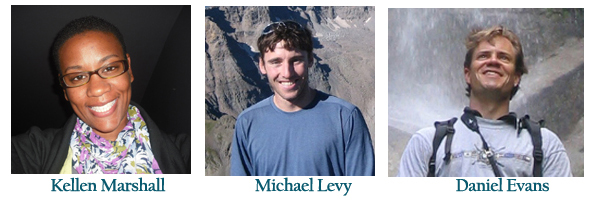ESA Announces 2011 Graduate Student Policy Award Winners
Graduate students from the University of Illinois, West Virginia University and University of Washington will travel to nation’s capital to speak to lawmakers about investment in science

WASHINGTON, DC — The Ecological Society of America (ESA), a professional organization of 10,000 ecological scientists, is pleased to announce the recipients of its 2011 Graduate Student Policy Award. The award affords ESA graduate students the opportunity to participate in two days of science policy activities, including meetings with congressional offices. This year’s winners are: Kellen Marshall(University of Illinois-Chicago), Michael Levy (West Virginia University), and Daniel Evans (University of Washington).
All three students have demonstrated their commitment to engaging in public policy and the ESA Award will allow them to build on their experiences. Marshall, Levy, and Evans will travel to Washington, DC in March to participate in a congressional visits event sponsored by the Biological Ecological Sciences Coalition (BESC) and co-chaired by ESA. The event will focus on the need for sustained federal investment in biological research and education. The three students will meet with congressional offices, be briefed by policy leaders on federal funding issues, and meet other scientists from across the country.
Kellen Marshall’s Ph.D. research focuses on holistic approaches to assess ecosystem health. Marshall served as a legislative intern for an Illinois state representative and has also engaged with Chicago city officials on environmental issues of particular concern to the African American community. She notes that she is working to “develop policy conversations that would be inclusive of emerging environmental justice issues such as food deserts, zoning of urban agriculture, and barriers to entry, access to natural spaces, brown vs. green space, and sustainability and green infrastructure at all levels of government.” Marshall is a recipient of a National Science Foundation (NSF) IGERT Fellowship.
Michael Levy is pursuing a Master’s degree in biology at West Virginia University. His research addresses the ecological outcomes of current mine reclamation practices. Levy writes a weekly opinion column for the West Virginia University campus newspaper in which he addresses policy and science issues and seeks to generate interest in the natural systems that support life. Pointing to the recent Environmental Protection Agency veto of a mountaintop removal permit in southern West Virginia, Levy notes the “efficacy of policy to affect environmental outcomes.” As a result of the agency’s recent action, says Levy, over seven miles of high elevation streams and 2,000 acres of forest will not be upended.
Daniel Evans’ Ph.D. research at the University of Washington focuses on endangered plants in heavily fragmented forests. He is also working towards a Master’s degree in Environmental Policy and Management. Evans points out that federal support of research is essential to meeting pressing environmental challenges facing the United States. He works with high school biology and marine science teachers in Seattle through a NSF GK12 Teaching Fellowship. He led a homeowners’ association to increase its energy efficiency and previously worked for the U.S. Geological Survey to assess potential impacts of highway construction on endangered songbirds.
The ESA Graduate Student Policy Award is one of several ways the Society works to offer its graduate student members opportunities to gain public policy experience. The Society also provides policy training during its annual meeting and by request throughout the year. ESA graduate student members also may run—through ESA’s Student Section—to serve on several ESA standing committees, including the Public Affairs Committee, which works closely with ESA’s Washington, DC-based Public Affairs Office (www.esa.org/pao) and focuses on activities to engage ecological scientists with policymakers and the media.